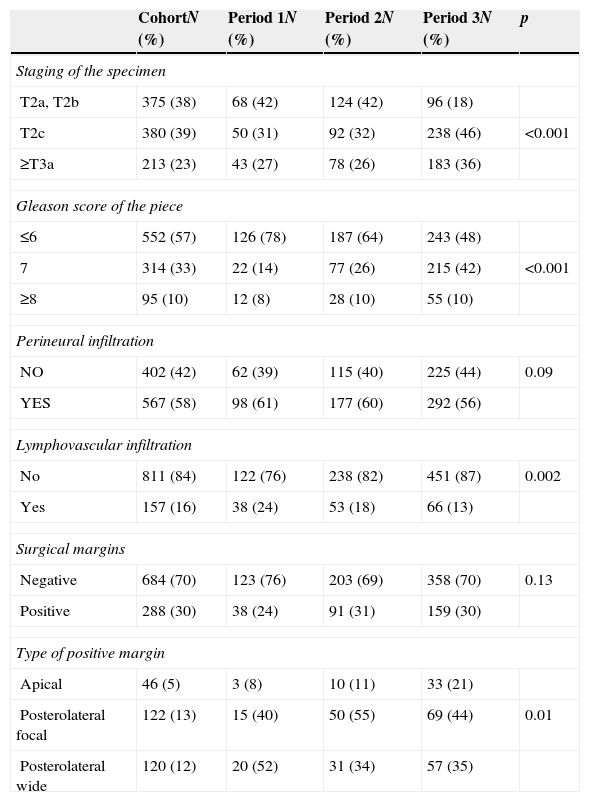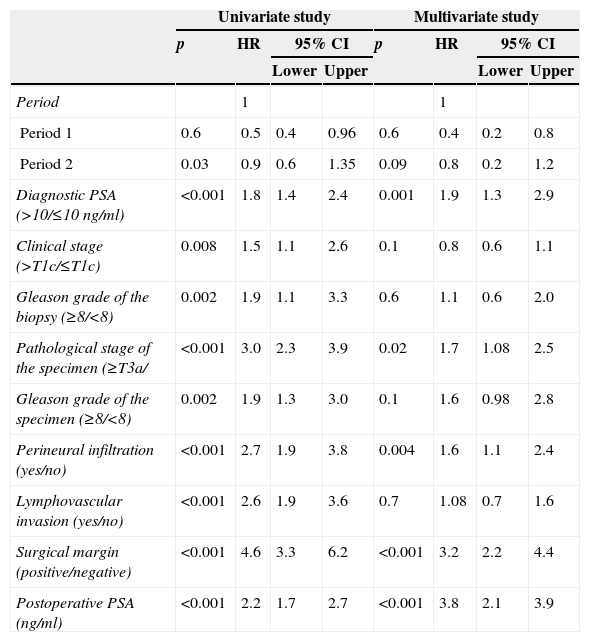To evaluate the oncological profile and risk of biochemical recurrence of patients with prostate cancer who underwent radical prostatectomy based on the time period in which the patients were operated. To evaluate the differences in prostate-specific antigen (PSA) at diagnosis of patients with or without biochemical recurrence based on these time periods.
Material and methodsObservation carried forward study of a cohort of 972 radical prostatectomies performed during three time periods (1994–2000, 2001–2006, 2007–2011). The importance of PSA at diagnosis on the time periods and on biochemical recurrence was assessed using a generalized linear model. The independent predictive behavior of biochemical recurrence was analyzed using Cox regression.
ResultsThe median follow-up was 38 (16–76) months. PSA levels at diagnosis were higher in the period 1994–2000 (12.97ng/ml, p<0.001). Seventy-two percent of the patients from the period 2007–2011 were diagnosed as clinical stage T1c (p<0.001), compared with 55% from the period 1994–2000. The percentage of extracapsular extension in the specimen decreased from 27% to 18% from the period 1994–2000 to the period 2007–2011 (p<0.001). The percentage of patients with biochemical recurrence went from 38% to 14% from the first to the third period (p>0.001). The difference between PSA levels at diagnosis for the patients with or without biochemical recurrence was independent of the period (p=0.84). The period during which surgery was performed was not an independent predictive factor for biochemical recurrence (p=0.09).
ConclusionsPatients from the 2007–2011 period had less extracapsular disease in the radical prostatectomy. The period was not an independent predictive factor for biochemical recurrence.
Evaluar el perfil oncológico y el riesgo de recidiva bioquímica de pacientes con cáncer de próstata sometidos a prostatectomía radical en función del periodo en el que fueron intervenidos. Evaluar las diferencias en el PSA al diagnóstico de los pacientes con o sin recidiva bioquímica en función de dichos periodos.
Material y métodosDiseño observacional hacia delante de una cohorte de 972 prostatectomías radicales realizadas en 3 periodos (1994–2000, 2001–2006, 2007–2011). La importancia del PSA al diagnóstico en los periodos y en la recidiva bioquímica se evaluó mediante modelo lineal generalizado. El comportamiento predictivo independiente de recidiva bioquímica se analizó mediante regresión de Cox.
ResultadosLa mediana de seguimiento fue de 38 (16–76) meses. El PSA diagnóstico fue más alto en el periodo 1994–2000 (12,97ng/ml, p<0,001). Un 72% de los pacientes del periodo 2007–2011 frente al 55% de los del periodo 1994–2000 se diagnosticaron con estadio clínico T1c (p<0,001). El porcentaje de extensión extracapsular en la pieza disminuyó del 27 al 18% del periodo 1994–2000 al periodo 2007–2011 (p<0,001). El porcentaje de pacientes con recidiva bioquímica pasó del 38 al 14% del primer al tercer periodo (p>0,001). La diferencia entre el PSA al diagnóstico de los pacientes con o sin recidiva bioquímica fue independiente del periodo (p=0,84). El periodo en que se realiza la cirugía no es un factor predictivo independiente de recidiva bioquímica (p=0,09).
ConclusionesLos pacientes del periodo 2007–2011 presentan menos enfermedad extracapsular en la prostatectomía radical. El periodo no es un factor predictivo independiente de recidiva bioquímica.












